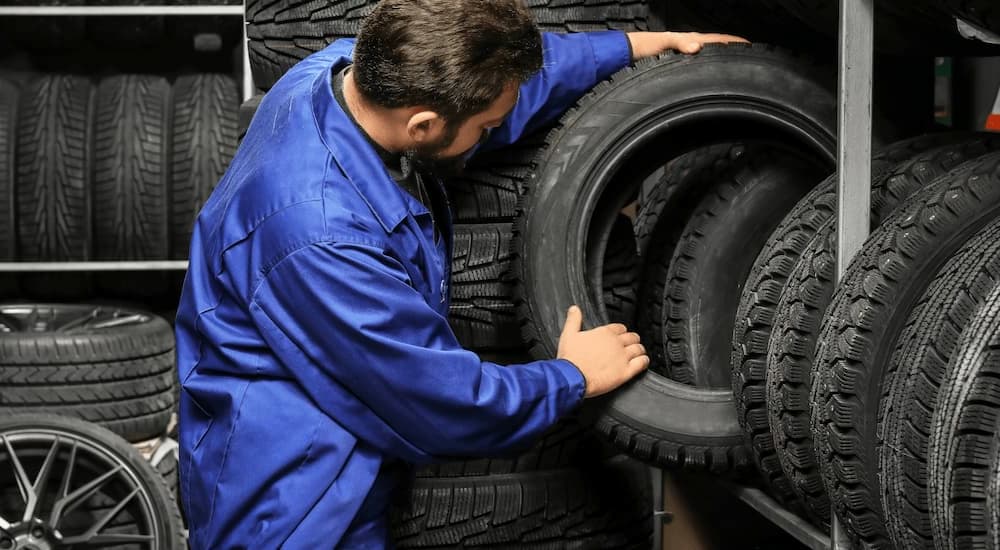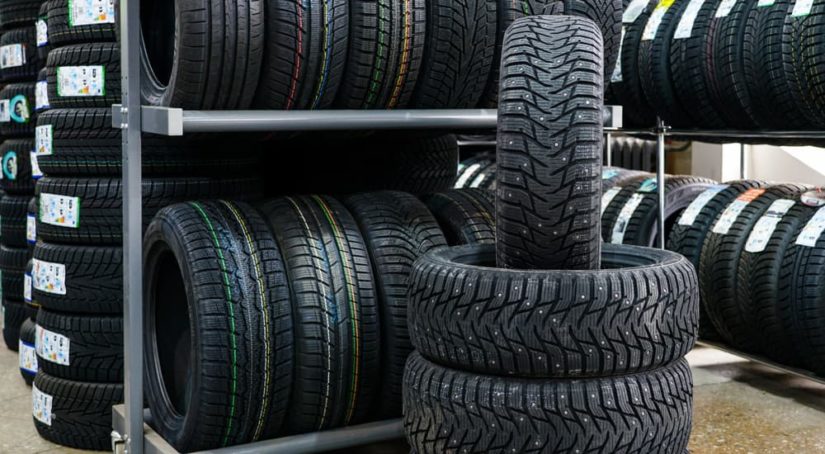Brace yourselves: winter is coming. Now that we’ve gotten that obligatory reference out of the way, it’s time to talk about the time of year that very few look forward to. For children across the country, it means snow days, sledding, and frolicking around the frost without a care in the world. While it’s fun to look back at those days with fondness and nostalgia, the reality is that driving a vehicle in the snow can be difficult and even dangerous. If you do a fair amount of driving in an area that sees heavy snowfall, being prepared is important. Today, we’ll be examining winter tires and whether or not they’re a necessity for the year ahead. If you think you need winter tires, this guide will help you make the right choice.
What Are Winter Tires?
As the name suggests, winter tires are specifically designed to allow for safer and easier driving during the winter. That said, they’re not a necessity in every type of climate. The need for them depends upon the geographic area in which you live and the type of weather you experience. Some places experience little to no snowfall, so drivers can easily handle winter with the same pair of tires they use all year long. Usually, all-season tires are what get used for these situations.
This sometimes leads to the misconception that all-season tires are good enough all year long in climates where the temperatures drop well below freezing and heavy snowfall is a common experience. There are two elements that separate true winter tires from all-season tires, and they mean all the difference when traveling through arduous winter conditions.
Improved Rubber Compound
One disadvantage of all-season tires in freezing temperatures is the rubber they’re built from. When rubber freezes, it loses its elasticity and, in some cases, can even break apart if exposed for long periods of time. To see this in action, place a rubber band in the freezer and wait for a few hours. There’s a good chance it will break apart quite easily. While your all-season tires won’t fall apart in below-zero weather, they will have less grip on the road, increasing stopping distances. Winter tires are made from a different rubber compound that’s designed to stay flexible in colder temperatures, which will maintain traction and grip the road better.
Tread Depth and Design
When weather conditions are normal, all-season tires work just fine in gripping the road. However, the tread is really only designed to handle water during moderate rainfall. Road conditions change drastically during severe winter weather. Aside from the snow that accumulates on the roads, they also become more slippery, and this causes normal tires to lose traction easily. Snow tires have deeper treads which allow them to dig through snow to find the firm ground beneath. They also have micro-treads known as “sipes” that provide a larger contact patch for handling icy roads. With these special design features, winter tires allow your car to maintain traction on the road in all conditions.

Should I Get Winter Tires?
Deciding whether or not you should get winter tires hinges upon a few determining factors. The first of which is how often you drive your vehicle and what your weekly commute is like. For instance, winter tires might be an excellent investment if part of your daily routine requires you to travel a considerable distance between home, work, and taking children to school. Winter tires are also something you can use for a substantial portion of the year. In northern climates, snowfall usually begins in November and doesn’t trail off until March, so if you purchase a set of winter tires, you’ll be using them for almost half of the year.
Can I Leave My Winter Tires on My Vehicle All Year Long?
In theory, you could, but it’s not advisable. Investing in a set of winter tires is exactly that––an investment. An advantage to purchasing winter tires is that by doing so, you’ll actually prolong the duration of the tires you use the other half of the year. More importantly, the low-temperature rubber used in winter tires wears out quickly when exposed to summer heat, and tire tread designed for ice and snow doesn’t perform as well on dry roads. While using winter tires year-round may seem like a way to save money, you will actually be spending more on tires and reducing your car’s performance in the process.
Do I Need Winter Tires If My Vehicle Has AWD?
A common misconception about AWD is that it’s a surefire way to combat the hazardous road conditions that occur during the winter. Yes, it is true that AWD can be very effective in off-roading and battling snow drifts. However, AWD only helps apply power to the wheels. That means it will allow you to accelerate faster in slippery conditions but does nothing to help you turn or stop. The purpose behind winter tires is that they grip the road and provide better traction. One of the major causes of accidents during the winter is losing control and being unable to stop in time due to slippery road conditions. Winter tires will help with that; AWD will not.

When Should I Put My Winter Tires On?
A mistake that some drivers make is waiting until the first snowfall to get their winter tires installed. Because it’s a job best left to professionals, many service stations get booked with tire installations once the weather begins to change and temperatures start to drop. The best way to determine when to install your winter tires is by following the weather reports. The turning point is 45 degrees Fahrenheit. When temperatures begin to drop below this level, schedule an appointment to have your winter tires installed.
How Do I Store My Tires When Winter Is Over?
Once the middle of March rolls around and the temperatures return to above freezing, it’s time to have your winter tires removed and your regular tires reinstalled on your vehicle. In order to ensure the structural integrity and quality of your winter tires, it’s important that they’re properly stored until you need them the following year. Clean them thoroughly to remove any debris and salt that have accumulated. After making sure they’re completely dry, seal them in an air-tight bag to prevent deterioration and store them in a location where room temperature is consistent.
Be Safe in the Snow
Whether or not you decide to invest in a set of winter tires this year, there are a few important things you should know. The combination of dealing with the winter months and the coinciding holiday season can usually cause an unexpected amount of stress. It’s important to maintain the habits of a responsible driver during this time of year and not give in to the aggravation of the season. Snowfall and freezing temperatures cause road conditions that can range from unfavorable to dangerous. Remember to drive at a reduced speed that will allow for sufficient reaction time and follow at an appropriate distance to compensate for your vehicle’s diminished braking capability. Limit your driving to necessary trips, and remember that slow and steady wins the day. You might be a few minutes late to that holiday party, but at least you’ll arrive in one piece.



